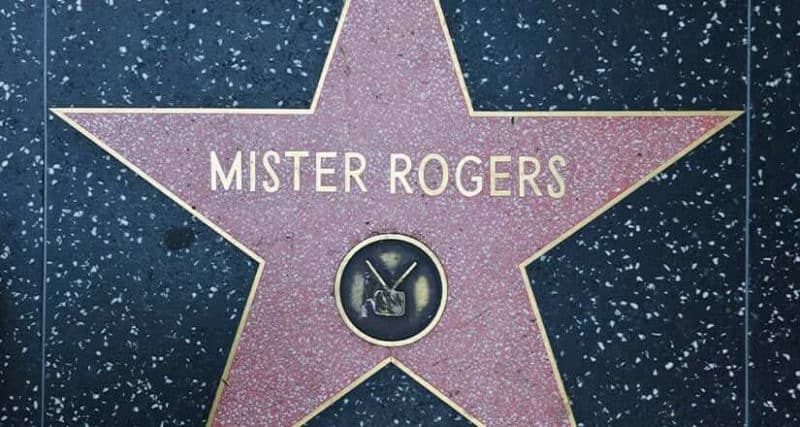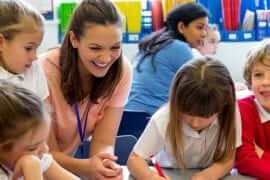4 Lessons from Mr. Rogers ANY Teacher Can Use
For many in my generation who grew up in the 80s Fred Rogers holds a special place in our childhood memories. Every day after nursery school I scrambled in front of the television to watch Sesame Street, followed by Mister Rogers’ Neighborhood while my mom made dinner. They were the only TV shows I watched.
As an adult I enjoyed the documentary Won’t You Be My Neighbor even more than I expected. The passion Fred Rogers showed for supporting the social and emotional health of children was so inspiring, and his message couldn’t be more timely for today’s generation. In an age where technology has put more distance between people and undermined the social skills development of many children and adults, we need to find ways to help children and adults alike connect and communicate on the personal level that Mister Rogers encouraged.
So in honor of this pioneer for children, let’s take a look at four lessons from Mister Rogers that all of us teachers at any grade level can use in our classrooms.
LESSON 1: We Are ALL Responsible
“We live in a world in which we need to share responsibility. It’s easy to say ‘It’s not my child, not my community, not my world, not my problem.’ Then there are those who see the need and respond. I consider those people my heroes.”
Shared responsibility is such an important concept, and it should be instilled early and often. As we know, school is the perfect place to do this. Giving students roles and responsibilities in the classroom, even in high school, creates a sense of community and collective responsibility. As teachers we can also highlight the people in our schools and communities (and even in history lessons) who step up and take responsibility as the heroes they truly are.
LESSON 2: Pain & Mistakes Help You Grow
“There is no normal life that is free of pain. It’s the very wrestling with our problems that can be the impetus for our growth.”
Mister Rogers was an early proponent of having a growth mindset, which has become such a prominent concept in education recently. In fact, a quick Amazon search of the term yields hundreds of books, posters, videos, etc. Often associated with the concept of a growth mindset is the idea of having grit, which was succinctly defined in the Angela Duckworth TedTalk that has been viewed over 18 million times since its release in April 2013 and has been turned into a book. In a later interview with EdSurge she delved deeper into how teachers can help develop grit in their students by saying, “It is a natural human instinct to shy away from mistake-making, from confusion, from challenge…” Therefore, she argued that teachers should “provide a ritual and an opportunity [for students to learn from and correct their mistakes].” Just as Mister Rogers said, if we don’t tackle problems, we won’t grow.
LESSON 3: Showing Emotions Is Healthy
“People have said, ‘Don’t cry’ to other people for years and years, and all it has ever meant is, ‘I’m too uncomfortable when you show your feelings. Don’t cry.’ I’d rather have them say, ‘Go ahead and cry. I’m here to be with you.’”
I distinctly remember the episode of Mister Rogers’ Neighborhood when a goldfish died in the fish tank, and Mister Rogers buried him. He recalled the time when he was a boy and his dog died and commented on how sad he was and how he had cried. He made it clear it was okay to cry when you feel sad. That episode left such a strong impression on me that, years later, when my grandfather died, I remember using Mister Rogers’ words on my youngest sister to comfort her.
As teachers we deal with emotions all the time…our own and our students’. And while it is our job to help students learn to cope with and regulate their emotions, oftentimes the emotion needs to come out and be expressed before they can move past it. So it’s also our job to just be there for them when that happens.
LESSON 4: Accept Yourself & Others
“Love isn’t a state of perfect caring. It is an active noun like ‘struggle.’ To love someone is to strive to accept that person exactly the way he or she is, right here and now.”
Mister Rogers signed off every episode by saying “I like you just the way you are.” They are simple words that carry so much weight. In a world where people are inundated with images and videos presenting what we are “supposed” to look like and act like, it’s so important for everyone to accept and love themselves for what they are. Only then can we also accept and love others as they are.
As teachers this often looks like embracing the diversity of learners in our classrooms by meeting our students where they are in their learning and creating individual goals to move them forward. It also looks like encouraging kindness and understanding whenever possible. This article from The 74 outlines several good ways schools can encourage kindness and acceptance and highlights recent, heroic acts of kindness from across the country.
So, in a nutshell, here are the four principles that we educators can embrace in honor of the great Fred Rogers, as we go about our craft:
- Shared responsibility
- Growth mindset
- Emotional expression
- Acceptance and love
See you around the neighborhood!
-Megan Panek





